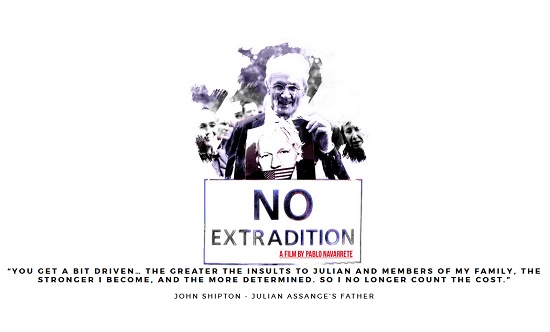
No Extradition (2020), a film by Pablo Navarrete
By Seamus O’ Tuairisc
No Extradition was released on 13 August in the run-up to the conclusion of the show trial of Julian Assange. The judgment in the case is due in January 2021 and, subject to further appeal, will determine whether Assange should be extradited to the US, where he faces charges of espionage. If convicted, he could face a sentence of 175 years imprisonment. The film utilises a fly-on-the-wall format, without any running commentary and consists of footage shot between June 2018 and January 2020. This primarily shows the numerous solidarity rallies and protests held before and after Assange’s ejection from the Ecuadorian embassy in London by the British police,after the US-friendly Ecuadorian government under Lenín Moreno revoked his asylum status in April 2019.
The film begins with an overview of the events that led to Assange facing extradition, including his role in founding WikiLeaks in 2006 and the specific leak that led to the US requesting his extradition – a video recorded in 2007 of a US Apache helicopter gunning down 18 innocent civilians in Iraq, including two Reuters journalists. The film largely centres on John Shipton, Assange’s father, who frequently travels between Australia and Britain to visit his son at Belmarsh prison, and to attend solidarity rallies alongside his supporters.
Although No Extradition makes very few political points of its own, it amplifies the many different viewpoints of the individuals and organisations at events featured in the film. These include a march to Belmarsh prison, several solidarity rallies across London and a demonstration outside Westminster Magistrates court. The film builds up its case against the extradition through the inclusion of various speeches given at these rallies.
One section focuses on the support that Assange has from the Latin American community and its particular importance. The US has a long history of interfering in the politics of countries across Latin America, including several CIA-initiated regime changes, and therefore many sections of the Latin American community would have strong support for Assange in his role in exposing the US’s crimes.
The end of the film features an interview between John Shipton and journalist Mohamed Elmaazi in January 2020, while Shipton was on his way to visit Assange in prison. Shipton covers various subjects, such as Assange’s current physical condition, which he describes as ‘dire’, and also more deeply personal questions about their relationship. He also elaborates on visiting conditions in Belmarsh, such as he and his son having to speak with their hands over their mouth because the movements of their mouths make what they are saying legible on the high-definition security cameras. At the time of the interview, Assange had recently been removed from solitary confinement after his lawyers and fellow prisoners had lobbied for this, and Shipton expressed his surprise that prisoners have more ethics than the British, US, Swedish and Australian governments..
While the film leans towards human interest, rather than the politics behind Assange’s ongoing persecution, it is very effective in rounding up all the events and dynamics leading up to this point and it makes clear why Assange must not be extradited to the US. Pablo Navarrete, the filmmaker, makes great use of the footage from the numerous protests and rallies, as well as the interview with Shipton to do this. The various speeches help to build a picture of the suffering Assange has endured from being confined to the Ecuadorian embassy for seven years and subsequently being held in solitary confinement at Belmarsh. Although the film largely focuses on Julian Assange and John Shipton as individuals, many of the speeches highlight how this case is not just about Assange, but part of the bigger fight for free and fair journalism, and how the US and Britain are colluding to send a warning to all others who dare to expose their atrocities.
Since the release of this film, Assange’s sham extradition hearing resumed in September and was marked by outrageous displays of aggression towards the defence’s witnesses from the court and prosecution, as well as the British court willingly allowing the US to interfere in its courtroom proceedings by accepting the further US indictment, which seeks to downplay the political nature of the charges against Assange. The verdict as to whether Assange will be extradited to the US to face this charges is due in January and in this short time before, we need to continue the fight to stop Assange’s extradition and to stand with all others who are fighting for the right to call out the injustices perpetrated by imperialism.
Trailers and details of how to access the film can be found on social media and at the film’s website, https://noextraditionfilm.com/. You can support the campaign against Julian Assange’s extradition here: https://dontextraditeassange.com/donate/




